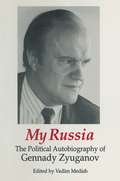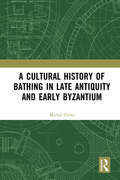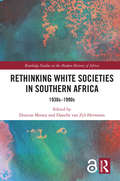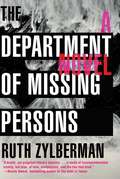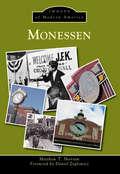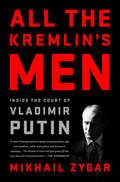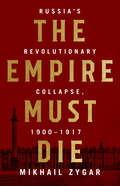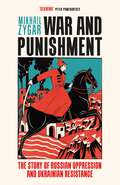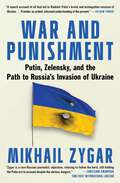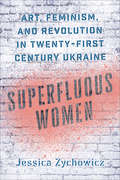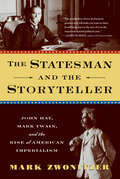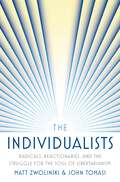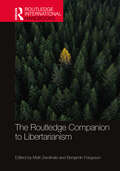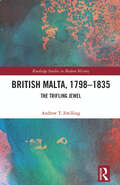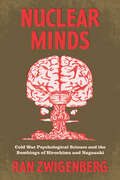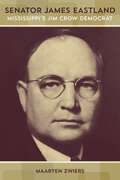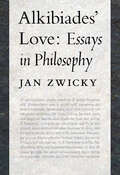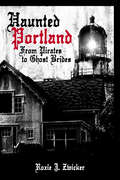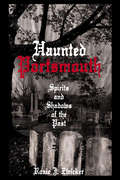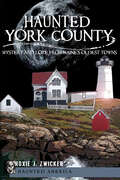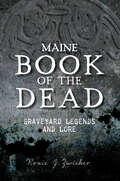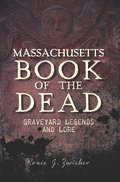- Table View
- List View
My Russia: The Political Autobiography of Gennady Zyuganov
by Gennady Zyuganov Vadim MedishGennady Andreevich Zyuganov is the leader of Russia's resurgent Communist Party and was Boris Yeltsin's strongest challenger in the summer 1996 presidential elections. Although his face became familiar to the world at that time, his ideas and his programme were mainly a subject of speculation. A former village teacher from Orel Province, Zyuganov came to Moscow in the 1980s to work in the ideology department of the Communist Party of the Soviet Union and to complete doctoral work in philosophy at Moscow State University. He is a prolific writer who has rebuilt the Communist Party on his vision of a Russian socialist great power. Today he leads the Communist faction in the Duma and is chairman of the united opposition movement - the National Patriotic Union. This volume is a compilation of Zyuganov's writings on Russia's past and present and her place in the world; Russia's fate under the new leadership of Gorbachev and Yeltsin; his own vision of Russia's future under a new Communist leadership; and his reflections on the 1996 presidential election of the Communist Party of the Russian Federation.
A Cultural History of Bathing in Late Antiquity and Early Byzantium
by Michal ZytkaThis book discusses social, religious and medical attitudes towards bathing in Late Antiquity. It examines the place of bathing in late Roman and early Byzantine society as seen in the literary, historical, and documentary sources from the late antique period. The author argues that bathing became one of the most important elements in defining what it meant to be a Roman; indeed, the social and cultural value of bathing in the context of late Roman society more than justified the efforts and expense put into preserving bathing establishments and the associated culture. The book contributes a unique perspective to understanding the changes and transformations undergone by the bathing culture of the day, and illustrates the important role played by this culture in contributing to the transitional character of the late antique period. In his examination of the attitudes of medical professionals and laymen alike, and the focus on its recuperative utility, Zytka provides an innovative and detailed approach to bathing.
Rethinking White Societies in Southern Africa: 1930s–1990s
by Danelle Van Zyl-HermannThis book showcases new research by emerging and established scholars on white workers and the white poor in Southern Africa. Rethinking White Society in Southern Africa challenges the geographical and chronological limitations of existing scholarship by presenting case studies from Angola, Mozambique, South Africa, Zambia and Zimbabwe tracking the fortunes of nonhegemonic whites during the era of white minority rule. Arguing against prevalent understandings of white society as uniformly wealthy or culturally homogeneous during this period, it demonstrates that social class remained a salient element throughout the twentieth century, how Southern Africa’s white societies were often divided and riven with tension, and how the resulting social, political and economic complexities animated white minority regimes in the region. Addressing themes such as the class-based disruption of racial norms and practices; state surveillance and interventions towards nonhegemonic whites, and its failures; and the opportunities and limitations of physical and social mobility, the volume mounts a forceful argument for the regional consideration of white societies in this historical context. Centrally, it extends the path-breaking insights emanating from scholarship on racialized class identities from North America to the African context to argue that race and class cannot be considered independently in Southern Africa. This book will be of interest to scholars and students of southern African studies, African history, and the history of race.
The Department of Missing Persons: A Novel
by Ruth ZylbermanA startling debut novel about the burden of Holocaust memory and the implacable zest for life. Thirty-six years after her mother was liberated from Bergen-Belsen, the unnamed narrator lives a comfortable life in Paris. Her mother sees ghosts at every turn, longing to find the family that disappeared behind the miasma of the Holocaust, but she cannot reconcile her mother’s trauma to the cheery bustle of daily life that surrounds them. The pain of memories that are not hers haunt her, weighing all too heavily until she is incapacitated by them, unable forge her own future. As our narrator becomes further entrenched in the past, a letter is sent by the Department of Missing Persons suggesting that her grandfather is not dead, though details of his survival and current situation are unknown. Along with her mother, the narrator begins a desperate hunt, fighting through the past and present, love and loss, and her own vulnerabilities to find the truth and rid them both of their lingering ghosts.
Monessen (Images of Modern America)
by Daniel Zyglowicz Matthew ShorrawNestled along a horseshoe curve of the Monongahela River in the Mid-Monongahela Valley of southwestern Pennsylvania, Monessen was settled in the mid-1800s, though it was not formally established and named until 1898, then chartered as a city in 1923. Throughout the 20th century, Monessen was known mainly for its industry, especially steel and wire. The city served as a site for Pittsburgh Steel until the decline of the steel industry. That has not stopped the caring and determined residents of Monessen from trying to recapture the vibrant culture of the city. This book reflects on the history of the city through the second half of the 20th century, showcasing how current residents have led Monessen into the 21st century.
All the Kremlin's Men: Inside The Court Of Vladimir Putin
by Mikhail Zygar"I read this book in one night, truly a page-turner. It leaves a profoundly scary impression: [Putin's court is the] real House of Cards." --Lev Lurie, writer and historianAll the Kremlin's Men is a gripping narrative of an accidental king and a court out of control. Based on an unprecedented series of interviews with Vladimir Putin's inner circle, this book presents a radically different view of power and politics in Russia. The image of Putin as a strongman is dissolved. In its place is a weary figurehead buffeted--if not controlled--by the men who at once advise and deceive him.The regional governors and bureaucratic leaders are immovable objects, far more powerful in their fiefdoms than the president himself. So are the gatekeepers-those officials who guard the pathways to power-on whom Putin depends as much as they rely on him. The tenuous edifice is filled with all of the intrigue and plotting of a Medici court, as enemies of the state are invented and wars begun to justify personal gains, internal rivalries, or one faction's biased advantage.A bestseller in Russia, All the Kremlin's Men is a shocking revisionist portrait of the Putin era and a dazzling reconstruction of the machinations of courtiers running riot.
The Empire Must Die: Russia's Revolutionary Collapse, 1900-1917
by Mikhail ZygarFrom Tolstoy to Lenin, from Diaghilev to Stalin, The Empire Must Die is a tragedy of operatic proportions with a cast of characters that ranges from the exotic to utterly villainous, the glamorous to the depraved.In 1912, Russia experienced a flowering of liberalism and tolerance that placed it at the forefront of the modern world: women were fighting for the right to vote in the elections for the newly empowered parliament, Russian art and culture was the envy of Europe and America, there was a vibrant free press and intellectual life. But a fatal flaw was left uncorrected: Russia's exuberant experimental moment took place atop a rotten foundation. The old imperial order, in place for three hundred years, still held the nation in thrall. Its princes, archdukes, and generals bled the country dry during the First World War and by 1917 the only consensus was that the Empire must die.Mikhail Zygar's dazzling, in-the-moment retelling of the two decades that prefigured the death of the Tsar, his family, and the entire imperial edifice is a captivating drama of what might have been versus what was subsequently seen as inevitable. A monumental piece of political theater that only Russia was capable of enacting, the fall of the Russian Empire changed the course of the twentieth century and eerily anticipated the mood of the twenty-first.
War and Punishment: The Story of Russian Oppression and Ukrainian Resistance
by Mikhail Zygar'History is made up of myths,' writes the renowned Russian dissident journalist Mikhail Zygar. 'Alas, our myths led us to the fascism of 2022. It is time to expose them.' Drawing from his perilous career investigating the frontiers of the Russian empire, Zygar reveals how 350 years of propaganda, bad historical scholarship, folk tales and fantasy spurred his nation into war with Ukraine.How did a German monk's fear of the Ottoman Empire drive him to invent the fiction of a united Russian world? How did corny spy novels about a 'Soviet James Bond' inspire Vladimir Putin to join the KGB? How did Alexander Pushkin's admiration for a poem by Lord Byron end with him slandering the legendary chief of the Cossacks? And how did Putin underestimate a rising TV comic named Volodymyr Zelensky, failing to see that his satire had become deadly serious, and that his country would be a joke no longer?A noted expert on the Kremlin with unparalleled access to hundreds of players in the current conflict - from politicians to oligarchs, gangsters to comedians (not least Zelensky himself) - Zygar chronicles the power struggles from which today's politics grew, and digs out the essential truths from behind layers of seductive legend. By surveying the strange, complex record of Russo-Ukrainian relations, War and Punishment reveals exactly how the largest nation on Earth lost its senses. A work of history can't undo the past or transform the present, but sometimes it can shape the future.In fact, that's how the story begins.
War and Punishment: Putin, Zelensky, and the Path to Russia's Invasion of Ukraine
by Mikhail ZygarA NEW YORKER BEST BOOK OF 2023 From &“one of Russia&’s smartest and best-sourced young journalists&” (The New York Times)—the first work by a Russian author to reveal his country&’s history of oppressing Ukraine, providing an unprecedented overview of the war for Ukrainian independence that affects us all.As soon as the Russian invasion of Ukraine began, prominent independent Russian journalist Mikhail Zygar circulated a Facebook petition signed first by hundreds of his cultural and journalistic contacts and then by thousands of others. That act led to a new law in Russia criminalizing criticism of the war, and Zygar fled Russia. In his time as a journalist, Zygar has interviewed President Zelensky and had access to many of the major players—from politicians to oligarchs. As an expert on Putin&’s moods and behavior, he has spent years studying the Kremlin&’s plan regarding Ukraine, and here, in clear, chronological order he explains how we got here. In 1996 to 2004, Ukraine became an independent post-Soviet country where everyone was connected to the former empire at all levels, financially, culturally, psychologically. However, the elite anticipated that the empire would be back and punish them. From 2004 to 2018, there were many states inside one state, each with its own rulers/oligarchs and its own interests—some of them directly connected with Russia. In 2018, a new generation of Ukrainians arrive, and having grown in an independent country, they do not consider themselves to be part of Russia—and that was the moment when the war began, as Putin could not tolerate losing Ukraine forever. Authoritative, timely, and vitally important, this is an unique overview of the war that continues to threaten the future of the entire world as we know it.
Superfluous Women: Art, Feminism, and Revolution in Twenty-First-Century Ukraine
by Jessica ZychowiczSuperfluous Women tells the unique story of a generation of artists, feminists, and queer activists who emerged in Ukraine after the collapse of the Soviet Union. With a focus on new media, Zychowicz demonstrates how contemporary artist collectives in Ukraine have contested Soviet and Western connotations of feminism to draw attention to a range of human rights issues with global impact. In the book, Zychowicz summarizes and engages with more recent critical scholarship on the role of digital media and virtual environments in concepts of the public sphere. Mapping out several key changes in newly independent Ukraine, she traces the discursive links between distinct eras, marked by mass gatherings on Kyiv’s main square, in order to investigate the deeper shifts driving feminist protest and politics today.
The Statesman and the Storyteller: John Hay, Mark Twain, and the Rise of American Imperialism
by Mark ZwonitzerIn a dual biography covering the last ten years of the lives of friends and contemporaries, writer Samuel Clemens (aka Mark Twain) and statesman John Hay (who served as secretary of state under presidents William McKinley and Theodore Roosevelt), The Statesman and the Storyteller not only provides an intimate look into the daily lives of these men but also creates an elucidating portrait of the United States on the verge of emerging as a world power. And just as the narrative details the wisdom, and the occasional missteps, of two great men during a tumultuous time, it also penetrates the seat of power in Washington as the nation strove to make itself known internationally--and in the process committed acts antithetical to America’s professed ideals and promises. The country’s most significant move in this time was to go to war with Spain and to eventually wrest control of Cuba, Puerto Rico, and the Philippines. In what has to be viewed as one of the most shameful periods in American political history, Filipinos who believed they had been promised independence were instead told they were incapable of self-government and then violently subdued in a war that featured torture and execution of native soldiers and civilians. The United States also used its growing military and political might to grab the entirety of the Hawaiian Islands and a large section of Panama. As secretary of state during this time, Hay, though a charitable man, was nonetheless complicit in these misdeeds. Clemens, a staunch critic of his country’s imperialistic actions, was forced by his own financial and family needs to temper his remarks. Nearing the end of their long and remarkable lives, both men found themselves struggling to maintain their personal integrity while remaining celebrated and esteemed public figures. Written with a keen eye--Mark Zwonitzer is also an award-winning documentary filmmaker--and informed by the author’s deep understanding of the patterns of history, The Statesman and the Storyteller has the compelling pace of a novel, the epic sweep of historical writing at its best, and, in capturing the essence of the lives of Hay and Twain, the humanity and nuance of masterful biography.
The Individualists: Radicals, Reactionaries, and the Struggle for the Soul of Libertarianism
by Matt Zwolinski John TomasiA sweeping history of libertarian thought, from radical anarchists to conservative defenders of the status quoLibertarianism emerged in the mid-nineteenth century with an unwavering commitment to progressive causes, from women’s rights and the fight against slavery to anti-colonialism and Irish emancipation. Today, this movement founded on the principle of individual liberty finds itself divided by both progressive and reactionary elements vying to claim it as their own. The Individualists is the untold story of a political doctrine continually reshaped by fierce internal tensions, bold and eccentric personalities, and shifting political circumstances.Matt Zwolinski and John Tomasi trace the history of libertarianism from its origins as a radical progressive ideology in the 1850s to its crisis of identity today. They examine the doctrine’s evolution through six defining themes: private property, skepticism of authority, free markets, individualism, spontaneous order, and individual liberty. They show how the movement took a turn toward conservativism during the Cold War, when the dangers of communism at home and abroad came to dominate libertarian thinking. Zwolinski and Tomasi reveal a history that is wider, more diverse, and more contentious than many of us realize.A groundbreaking work of scholarship, The Individualists uncovers the neglected roots of a movement that has championed the poor and marginalized since its founding, but whose talk of equal liberty has often been bent to serve the interests of the rich and powerful.
The Routledge Companion to Libertarianism (Routledge International Handbooks)
by Matt ZwolinskiHave you ever wondered what libertarians think about vaccine mandates? About gun control? About racial and sexual inequalities? While libertarianism is well known as a political theory relating to the scope and justification of state authority, the breadth and depth of libertarian work on a wide range of other topics in social and political philosophy is less well known. This handbook is the first definitive reference on libertarianism that offers an in-depth survey of the central ideas from across philosophy, politics, and economics, including applications to contemporary policy issues. The forty chapters in this work provide an encyclopedic overview of libertarian scholarship, from foundational debates about natural rights theories vs. utilitarian approaches, to policy debates over immigration, punishment and policing, and intellectual property. Each chapter presents a comprehensive and up-to-date overview of historical and contemporary libertarian thought on its subject, and thus serves as an essential guide to current scholarship, and a starting place for discovering future lines of research. The book also contains a section on criticisms of libertarianism, written by leading scholars from the feminist, republican, socialist, and conservative perspectives, as well as a section on how libertarian political theory relates to various schools of economic thought, such as the Chicago, Austrian, Bloomington, and Public Choice schools. This book is an essential and comprehensive guide for anyone interested in libertarianism, whether sympathizer or critic.
British Malta, 1798–1835: The Trifling Jewel (Routledge Studies in Modern History)
by Andrew T. ZwillingBritish Malta, 1798–1835 explores the incorporation and early administration of Malta as a British protectorate, and later as a Crown colony.Few connections existed between Great Britain and Malta before 1798, but Napoleon’s Mediterranean ambitions forged a link that remained even after the expulsion of the French. Malta’s incorporation into the British Empire encountered numerous and varied challenges: a deadly plague, diplomatic rows, economic rebuilding, continual food supply obstacles, and the unique challenge of governing a long-subjugated population. The Maltese people spent the previous 228 years ruled by an anachronistic crusading order that they were barred from joining. While most sought the protection of the British government, many also strove for more Maltese autonomy and agency. This tension helped define the first three and a half decades of British rule in Malta. Reaching beyond the traditional periodization of the Napoleonic era, this book provides a broader context of the fitful growth of the British Empire.Scholars and general readers drawn to the history of Malta, the British Mediterranean, and the expansion of the British Empire will find value in this narrative history.
Hiroshima
by Ran ZwigenbergIn 1962, a Hiroshima peace delegation and an Auschwitz survivor's organization exchanged relics and testimonies, including the bones and ashes of Auschwitz victims. This symbolic encounter, in which the dead were literally conscripted in the service of the politics of the living, serves as a cornerstone of this volume, capturing how memory was utilized to rebuild and redefine a shattered world. This is a powerful study of the contentious history of remembrance and the commemoration of the atomic bomb in Hiroshima in the context of the global development of Holocaust and World War II memory. Emphasizing the importance of nuclear issues in the 1950s and 1960s, Zwigenberg traces the rise of global commemoration culture through the reconstruction of Hiroshima as a 'City of Bright Peace', memorials and museums, global tourism, developments in psychiatry, and the emergence of the figure of the survivor-witness and its consequences for global memory practices.
Nuclear Minds: Cold War Psychological Science and the Bombings of Hiroshima and Nagasaki
by Ran ZwigenbergHow researchers understood the atomic bomb’s effects on the human psyche before the recognition of Post-Traumatic Stress Disorder. In 1945, researchers on a mission to Hiroshima with the United States Strategic Bombing Survey canvassed survivors of the nuclear attack. This marked the beginning of global efforts—by psychiatrists, psychologists, and other social scientists—to tackle the complex ways in which human minds were affected by the advent of the nuclear age. A trans-Pacific research network emerged that produced massive amounts of data about the dropping of the bomb and subsequent nuclear tests in and around the Pacific rim. Ran Zwigenberg traces these efforts and the ways they were interpreted differently across communities of researchers and victims. He explores how the bomb’s psychological impact on survivors was understood before we had the concept of post-traumatic stress disorder. In fact, psychological and psychiatric research on Hiroshima and Nagasaki rarely referred to trauma or similar categories. Instead, institutional and political constraints—most notably the psychological sciences’ entanglement with Cold War science—led researchers to concentrate on short-term damage and somatic reactions or even, in some cases, on denial of victims’ suffering. As a result, very few doctors tried to ameliorate suffering. But, Zwigenberg argues, it was not only that doctors “failed” to issue the right diagnosis; the victims’ experiences also did not necessarily conform to our contemporary expectations. As he shows, the category of trauma should not be used uncritically in a non-Western context. Consequently, this book sets out, first, to understand the historical, cultural, and scientific constraints in which researchers and victims were acting and, second, to explore how suffering was understood in different cultural contexts before PTSD was a category of analysis.
Senator James Eastland: Mississippi's Jim Crow Democrat (Making the Modern South)
by Maarten ZwiersIn the years following World War II, the national Democratic Party aligned its agenda more and more with the goals of the civil rights movement. By contrast, a majority of southern Democrats remained as committed as ever to a traditional, segregationist ideology. Through the career of Senator James Eastland, one of the mid-century's most prominent politicians, author Maarten Zwiers explores the uneasy, yet mutually beneficial relationship between conservative southerners and the increasingly liberal party to which they belonged. Mississippi Democrat James "Big Jim" Eastland began an influential four-decade career in the United States Senate in 1941, ultimately rising to become president pro tempore of the Senate, a position that placed him third in the line of presidential succession. His reputation for toughness developed from his unfailing and ruthless opposition to greater civil rights and his concern over the global spread of communism, as he believed participants in the two movements were working together to undermine the American way of life. Zwiers contends that despite Eastland's extreme positions, he still managed to maintain influence through productive relationships with his Senate colleagues-liberal as well as conservative. Though the progressive wing of the Democratic Party continued to push for stronger civil rights legislation, they valued compromise with southern senators like Eastland in order to ensure support from a region the Democrats could ill afford to lose. While Eastland's campaigning rhetoric was inflammatory, his ability to operate within the national political structure by leveraging moderate concessions contributed to his lengthy and effective career. Drawing on recently opened archival records, Maarten Zwiers offers a nuanced portrait of a man frequently portrayed as a southern zealot. Senator James Eastland provides a case study of the complicated relationship between party and party members that allowed Democrats to maintain power in the South for much of the twentieth century.
Imperial Unknowns
by Cornel ZwierleinIn this major new study, the history of the French and British trading empires in the early modern Mediterranean is used as a setting to test a new approach to the history of ignorance: how can we understand the very act of ignoring - in political, economic, religious, cultural and scientific communication - as a fundamental trigger that sets knowledge in motion? Zwierlein explores whether the Scientific Revolution between 1650 and 1750 can be understood as just one of what were in fact many simultaneous epistemic movements and considers the role of the European empires in this phenomenon. Deconstructing central categories like the mercantilist 'national', the exchange of 'confessions' between Western and Eastern Christians and the bridging of cultural gaps between European and Ottoman subjects, Zwierlein argues that understanding what was not known by historical agents can be just as important as the history of knowledge itself.
This Great National Object: Essays in Philosophy
by Jan ZwickyMaking extensive use of the National Archives and the Archives of Ontario, Styran and Taylor unveil previously unpublished information about the construction of the canals, including technical plans and drawings from a wide variety of sources. They illustrate the technical and management intricacies of building a navigational trade and commerce lifeline while also revealing the vivid characters - from businessman William Hamilton Merritt to engineer John Page - who inspired the project and drove it to completion. The history of the Welland Canals is a gripping tale of epic proportions. Given the ongoing importance of the Great Lakes in the North American economy, interest in the St. Lawrence Seaway - of which the Welland is "the Great Swivel Link" - and the relevance of labour history, This Great National Object will be of interest to enthusiasts and historians alike.
The Cambridge Companion to John Dryden
by Steven N. ZwickerJohn Dryden, Poet Laureate to Charles II and James II, was one of the great literary figures of the late seventeenth century. This Companion provides a fresh look at Dryden's tactics and triumphs in negotiating the extraordinary political and cultural revolutions of his time. The newly commissioned essays introduce readers to the full range of his work as a poet, as a writer of innovative plays and operas, as a purveyor of contemporary notions of empire, and most of all as a man intimate with the opportunities of aristocratic patronage as well as the emerging market for literary gossip, slander and polemic. Dryden's works are examined in the context of seventeenth-century politics, publishing and ideas of authorship. A valuable resource for students and scholars, the Companion includes a full chronology of Dryden's life and times and a detailed guide to further reading.
Haunted Portland: From Pirates to Ghost Brides (Haunted America Ser.)
by Roxie J ZwickerFollow Zwicker, author of Haunted Portsmouth and Haunted Pubs of New England, as she expertly navigates through this storied Yankee seaport's collection of creepy graveyards, tragic shipwrecks, eerie lighthouses and more. You'll discover such haunting yarns as the story of Lydia Carver-the "ghost bride" who drowned just offshore on the eve of her marriage - as well as the tale of the British captain and the American commander whose ghosts square off at nighttime in a famous local cemetery, a chilling reenactment of their fatal War of 1812 naval engagement. Read Haunted Portland and discover the dark side lurking beneath Portland's picture postcard exterior.
Haunted Portsmouth: Spirits and Shadows of the Past (Haunted America)
by Roxie J. ZwickerNew Hampshire&’s historic port town is no stranger to ghostly goings-on—from the local TV personality and author of Massachusetts Book of the Dead. A tour of Portsmouth&’s back alleys and docksides, filled with the lingering whispers and memories of generations long dead. Venture through the haunted past and present of Portsmouth, New Hampshire, if you dare. Before Portsmouth was a charming seaside community, it was a rough-and-tumble seaport. Hear phantom footsteps in the Point of Pines Burial Ground and mysterious voices at the Portsmouth Harbor Lighthouse, haunted by the ghost of its former keeper. Tour guide and hauntings expert Roxie Zwicker takes readers on a tour of the nation&’s third-oldest city, where buildings and street corners teem with ghostly stories and legends. Includes photos!
Haunted York County: Mystery and Lore from Maine's Oldest Towns (Haunted America)
by Roxie J. ZwickerRestless spirits in seemingly tranquil summer cottages, specters watching for phantom ships from a sea captain's mansion these are among the ghostly residents of one of New England's oldest counties. The harshly beautiful coastline of York County has a long history of storm, revolution and violence that seems to lure deceased residents from the ether. From the otherworldly mariners in the Boon Island Lighthouse to the terrifying cells of Old Gaol, America's oldest prison, an abundance of mysteries reflects the region's turbulent past. Join Roxie J. Zwicker, haunted history author and owner of New England Curiosities tours, as she delves into the chilling secrets and ghostly lore of York County.
Maine Book of the Dead: Graveyard Legends and Lore (American Legends)
by Roxie J. ZwickerMaine's graveyards contain the ancient memories and last words of woodsmen, lighthouse keepers, inventors, sea captains and the people who called this rugged land home. In an island cemetery rests Tall Barney, a six-foot-seven folk hero who single-handedly took down fifteen men in a Portland bar. Kittery holds the grave for the crew of the doomed ship the Hattie Eaton. Mount Hope Cemetery in Bangor is the final resting place for the famed "Sky Blue Madam" Fanny Jones and Public Enemy No. 1, gangster Al Brady. Camp Etna contains the grave of famed medium Mary Vanderbilt. Dead Man's Gulch in Wales holds many eerie tales of ghosts that refuse to leave. Join renowned author and tour guide Roxie Zwicker as she explores Maine's historic and legendary graveyards.
Massachusetts Book of the Dead: Graveyard Legends and Lore (Haunted America)
by Roxie J. ZwickerA historical tour of the Bay State&’s oldest burial grounds—and the sometimes-spooky stories behind them. Massachusetts's historic graveyards are the final resting places for tales of the strange and supernatural. From Newburyport to Truro, these graveyards often frighten the living, but the dead who rest within them have stories to share with the world they left behind. While Giles Corey is said to haunt the Howard Street Cemetery in Salem, cursing those involved in the infamous witch trials, visitors to the Forest Hills Cemetery in Jamaica Plain enjoy an arboretum and a burial ground with Victorian-era memorials. One of the oldest cemeteries in Massachusetts, Old Burial Hill in Marblehead, has been the final resting place for residents for nearly 375 years. Author Roxie Zwicker tours the Bay State's oldest burial grounds, exploring the stones, stories and supernatural lore of these hallowed places. Includes photos
